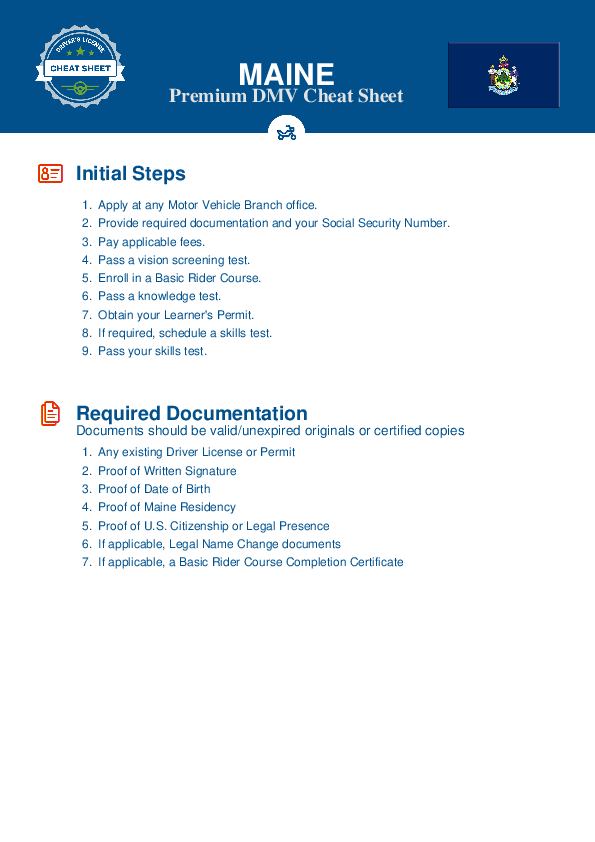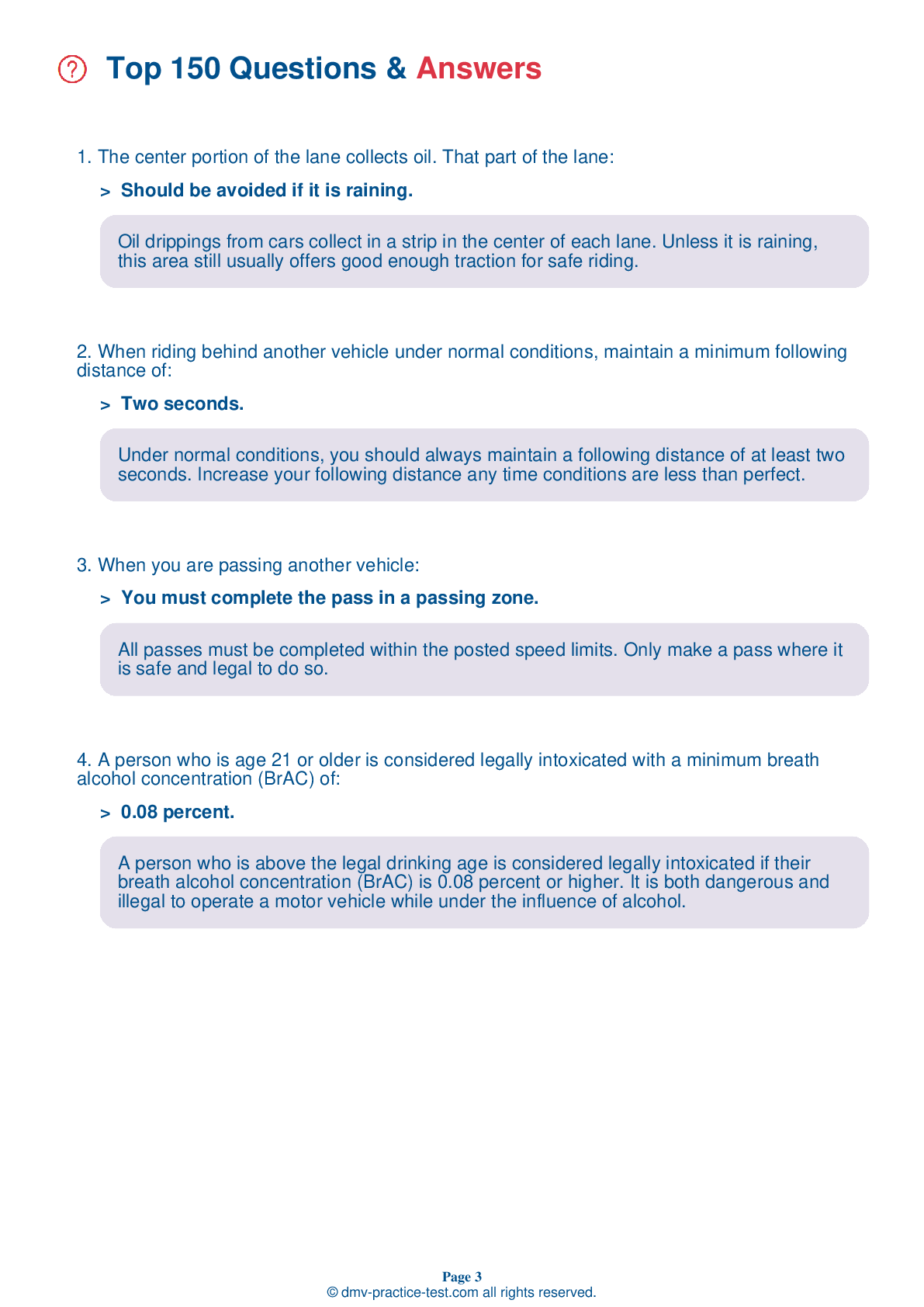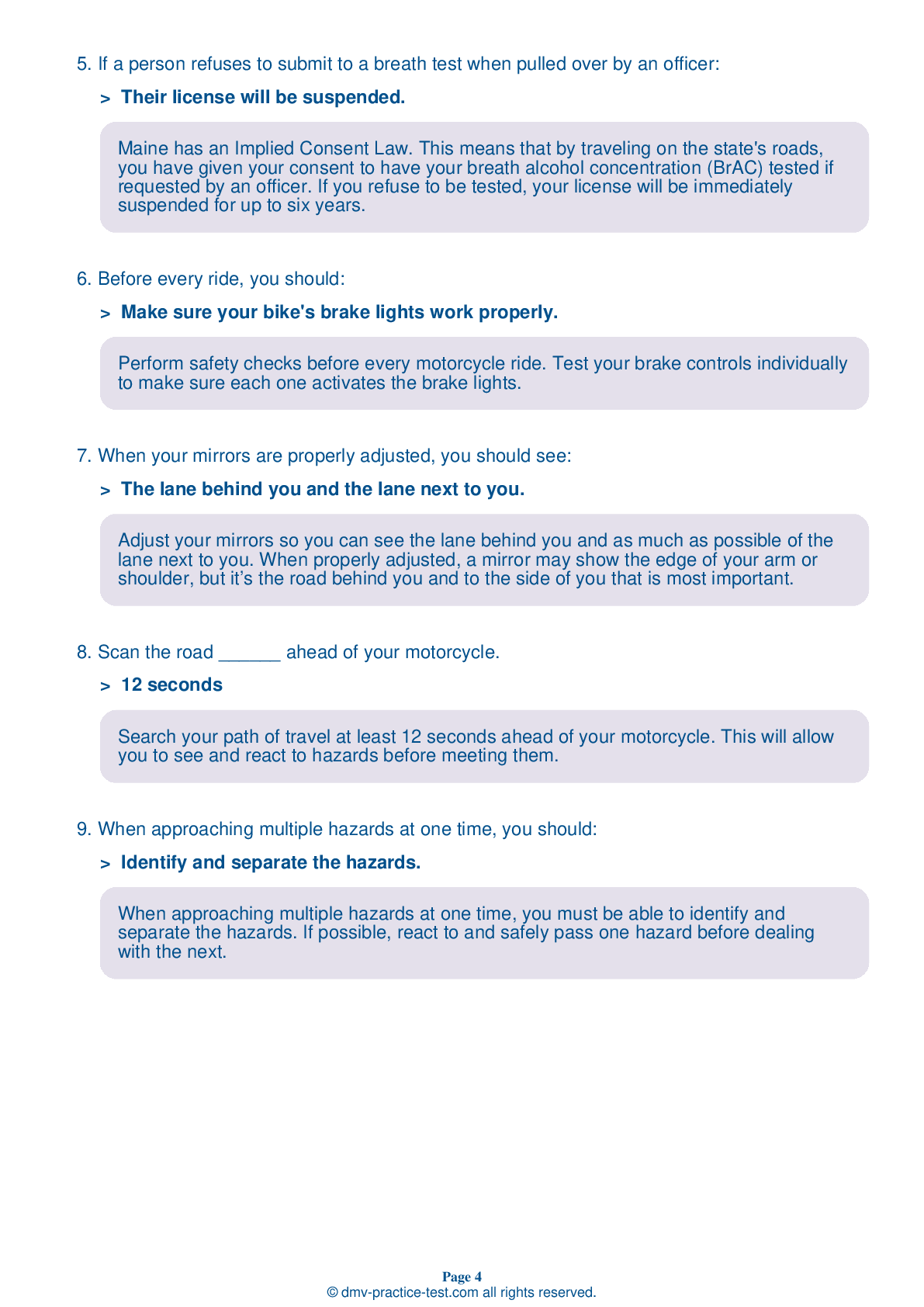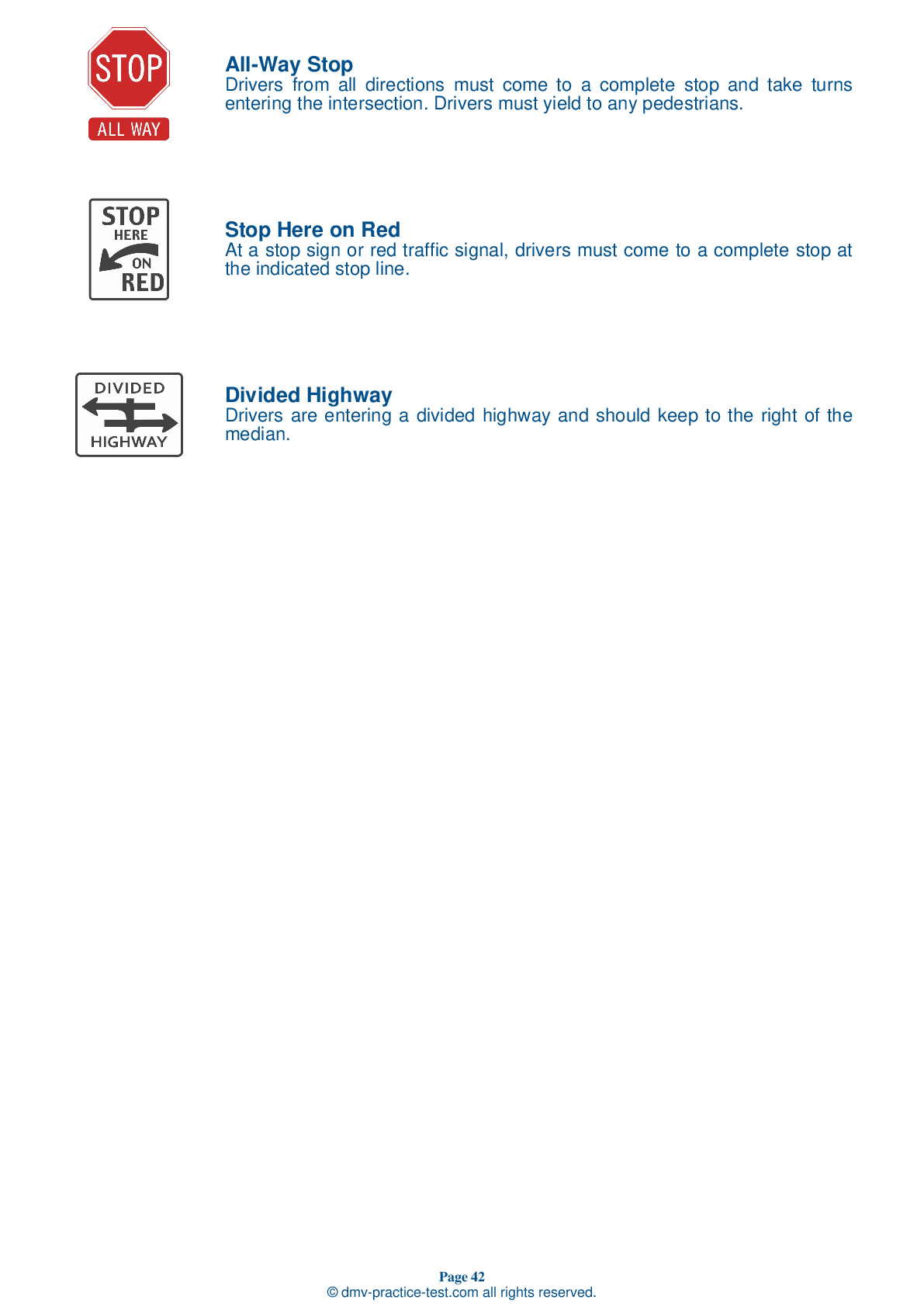DMV Permit Test #10
Motorcycle Test | License ME 2026 | FREE Online Practice! #10 Page 3 of 7
Take this FREE motorcycle test (license in ME 2026) to check your knowledge of the road rules. To improve your results, download a motorcycle handbook online, study theory, and practice for free on our website. Still worried about how to get a motorcycle license in Maine in 2026? Check our website for more sample tests, train as much as possible, and boost your grades!
50
40
16
15 . What is the best lane position for a motorcycle operator?
There is no single lane position that is best for all situations.
There is no lane position that is always best and no lane position that should always be avoided. Select a lane position that is appropriate for your current riding conditions, allowing you to maintain an adequate space cushion and be visible to others.
16 . When riding a motorcycle, clothing:
Can provide protection in the event of a crash.
The right clothing can provide vital protection if you are involved in a collision. Always wear a jacket and pants that fully cover your arms and legs, even in warm weather. Clothing should fit snugly enough that it does not flap in the wind but should also be loose enough that your movement is not restricted.
17 . Maximum straight-line braking is done by:
Using both the front and rear brakes while locking the rear wheel.
On a straightaway, you can stop in the shortest distance by using both brakes. Try to avoid locking either brake.
18 . Passengers should:
Never hold onto the operator.
Passengers should sit directly behind the operator and lean as the operator leans. They should sit as far forward as they can without crowding the operator, holding onto the operator's waist, hips, or belt.
19 . Use special care to use your mirrors in all of the following situations, except:
After you get off the motorcycle.
You should make a special point of checking your mirrors when you are stopped at an intersection, before changing lanes, and before slowing down. It is important to regularly check your mirrors.
20 . When it is raining, it is usually best to:
Increase your speed.
Wet pavement is especially slippery when it first begins to rain. Deposits of oil left by cars will not yet have washed off the roadway. If it is raining, it is safest to ride in the tire tracks left by cars. The left tire track will often be your best choice, although this may vary.
21 . When being passed by another vehicle, motorcyclists should be alert to:
All of the above.
When being passed, motorcyclists should be careful not to be hit by any part of the passing vehicle, including its mirrors. In addition to the vehicle itself, motorcyclists should also be aware of wind gusts coming from the passing vehicle and potential objects being thrown by a passenger in the vehicle who may not be paying attention to the road.
2026 Maine | Frequently Asked Questions
To acquire a motorcycle driver's license in Maine, you must first obtain a motorcycle learner's permit. This involves passing a written test. After practicing with the permit for at least 60 days, you can take the road test to get your motorcycle license. You must also complete an approved motorcycle rider education course.
In Maine, the minimum age for obtaining a motorcycle permit is 16 years old. This permit allows for supervised practice. To receive a motorcycle endorsement or license, the applicant must pass a written test and a road test. However, if the applicant is under 18, they must also complete an approved motorcycle rider education course.
Yes, you do need a dedicated license for motorcycle riding in Maine. A motorcycle endorsement can be added to your regular driver's license after passing a written exam and a road test. Alternatively, you can obtain a separate motorcycle-only license. Both require successful completion of an approved motorcycle rider education course or passing the state tests.
To apply for a motorcycle driver's license in Maine, you'll need: proof of identity (like a birth certificate or passport), proof of Maine residency, your Social Security number, and if applicable, legal presence documents. If under 18, parental consent and proof of driver education completion are required. A vision test and written exam must be passed, and fees paid.
Yes, to get a motorcycle license in Maine, you will need to take a written exam. This test assesses your knowledge of motorcycle operation, traffic rules, and safety practices. If you successfully complete an approved motorcycle rider education course, it may help waive the road test but not the written exam.
The motorcycle written test in Maine covers topics related to safe motorcycle operation. It includes subjects like traffic rules and regulations, road signs, motorcycle handling, braking, turning, carrying passengers or cargo, dealing with emergencies, and riding under challenging conditions like bad weather or heavy traffic. The test is designed to ensure you understand the basics of safe motorcycling.
No, you cannot substitute the written test with a motorcycle training course in Maine. The course can help prepare you for the test, but the written exam is a separate requirement for your motorcycle license. However, successful completion of a training course may waive the road test requirement. Always check with Maine's Bureau of Motor Vehicles for specific rules.
To enroll in a motorcycle training course in Maine, you need to contact an approved motorcycle rider education provider. You can find a list on the Maine Bureau of Motor Vehicles website. Once you choose a provider, contact them directly to register. The courses usually involve classroom instruction and hands-on training. Completion of the course may help waive the road test requirement for licensing.
No, you don't have to own a motorcycle to take the license test in Maine. You can use any motorcycle as long as it's registered, insured, and passes a basic safety inspection. However, you must be comfortable and familiar with the motorcycle you're using for the test.
Yes, you can use a friend's motorcycle for the driver's license evaluation in Maine. However, the motorcycle must be legally registered, insured, and meet all safety standards. Also, you should feel comfortable and confident riding it as you will be evaluated on your ability to safely operate it.
Yes, during the Maine motorcycle driving exam, several specific handling skills are tested. These include your ability to start and stop, turn and swerve, accelerate and decelerate smoothly, and properly use your mirrors and signals. You'll also be evaluated on your overall control of the motorcycle, including balance and posture.
Yes, new motorcycle drivers in Maine are given a provisional license for one year. During this period, they are not allowed to carry passengers, and they cannot drive between sunset and sunrise. Violation of these restrictions can lead to a suspension of the provisional license.
Yes, your Maine motorcycle license or a driver's license with a motorcycle endorsement allows you to operate a motorcycle in any other state in the U.S. However, you should be aware of and comply with each state's specific rules and regulations regarding motorcycle operation.
In Maine, motorcycle operators and passengers under 18 years of age are required to wear a helmet. While it's not mandatory for those 18 and older, wearing a helmet is highly recommended for safety reasons. The helmet must meet the standards established by the U.S. Department of Transportation.
Maine offers a Class M motorcycle license for operating motorcycles and motor-driven cycles. There isn't a variety of motorcycle licenses, but you can add a motorcycle endorsement to your existing Maine driver's license. This requires passing a written test and a road test. Contact your local BMV office for further information.
Yes, in Maine, you can add supplementary endorsements to your motorcycle license. These endorsements allow you to operate additional types of vehicles. For instance, a '3' endorsement allows operation of three-wheel motorcycles. Each endorsement requires passing a specific written and skills test. Check with the Bureau of Motor Vehicles for further details.
Yes, in Maine, the Bureau of Motor Vehicles (BMV) provides the motorcycle license test in several languages other than English. However, it's recommended to contact your local BMV office directly to confirm the availability of your preferred language before scheduling your test.
To prepare for the motorcycle license test, start by studying the Maine Motorcycle Operator Manual thoroughly. It covers all the information you'll need. Then, take several practice tests to familiarize yourself with the format and types of questions asked. Also, consider enrolling in a motorcycle safety course for hands-on training and additional test prep.
Yes, the motorcycle written exam in Maine can be taken in several languages other than English. However, it is advisable to contact your local Bureau of Motor Vehicles (BMV) branch beforehand to confirm the available languages and set up the necessary arrangements.
Yes, if you don't pass the motorcycle written test in Maine, you are allowed to retake it. However, you must wait a minimum of one day before retaking the test. It's important to study thoroughly to ensure you understand all the rules and regulations for operating a motorcycle safely.



